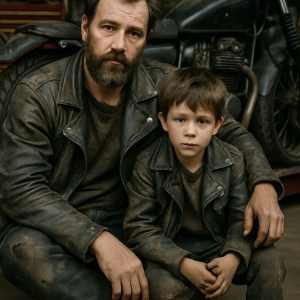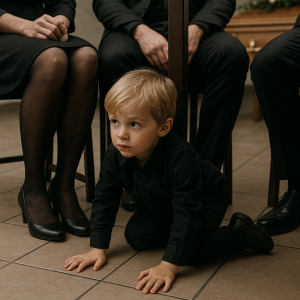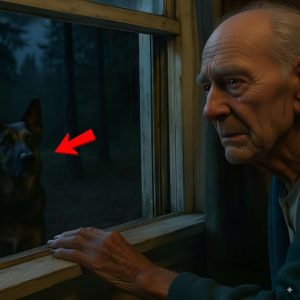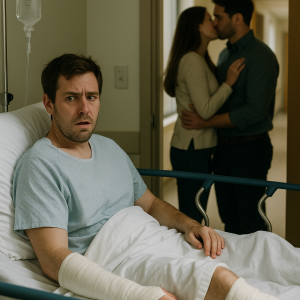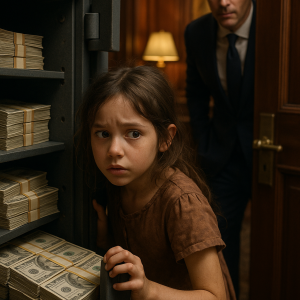The perfume reached me before the scream.
I was standing at the sink in my parents’ crowded kitchen, rinsing dishes, my arms sore from a full day of watching my niece while the rest of them lounged in the living room. My seven-year-old, Jesse, was off to the side with his crayons and coloring book. He never made much noise. He had already learned, in that house, that quiet was safer.
Then came the cry—a sharp, terrified sound that split the air.
“Mommy, my eyes!”
The plate slipped from my hands and shattered on the linoleum. I bolted.
He was collapsed near the hallway, curled into himself, tiny fingers pressed to his face as streaks of red-tinged tears seeped through.
“Jesse! Baby, let me see!” My voice cracked. But he kept his palms over his eyes, sobbing.
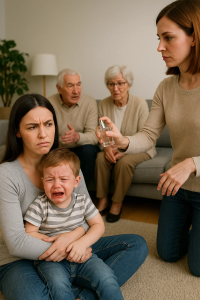
And then Mara spoke. My sister stood in the doorway, a glittering perfume bottle dangling casually from her hand. Her tone was detached, as though she were explaining a spilled drink.
“He wouldn’t stop staring at me. Gave me the creeps. I just taught him a little lesson about boundaries.”
I ripped the bottle from her and hurled it across the room. My hands shook. Jesse screamed harder, his face blotchy and raw, his eyelids screwed shut. As I tried to blot him gently with a damp cloth, the sound cut through me.
Laughter.
From the couch, my mother giggled, chips in her lap. “Well,” she said to my father, “at least he smells better now.”
My dad didn’t even lower his paper. “Should’ve taught him not to gawk. Boys like him always turn into perverts.”
I went rigid. It wasn’t just Mara—it was all of them. A shared verdict that his pain didn’t matter.
I scooped Jesse up, locked us in the bathroom, and rinsed his eyes over and over. His cries softened to whimpers, then to shaking breaths, and finally, to stillness. Not calm—just surrender. He dozed off in my lap on the cold tile floor.
I stayed there all night.
By morning, the knocks started. First Mara, sing-song. “Mom says you’re overreacting. He’s fine.”
Then my mother, sharper: “Open this damn door before you flood my floor. You always have to dramatize everything. No wonder Mara grew up stronger than you.”
I opened only long enough to pack Jesse’s bag.
“You’re not going anywhere,” my mom snapped. “You owe rent. We put food in your mouth and that… thing’s.”
“That thing is my son.”
“He’s a burden,” she hissed.
My father said nothing.
We walked out anyway. I didn’t own a car, so I carried Jesse the four miles to urgent care. The nurse took one look at his swollen, red eyes.
“What happened?”
“He was attacked,” I said.
“By who?”
“Family.” Saying it aloud made my stomach twist.
The doctor called it chemical irritation—no lasting damage, thankfully. I spent my last twenty-eight dollars on antibiotic drops. That night, we slept on a stained mattress in a coworker’s garage. As Jesse drifted off, he whispered, “Is the mean lady coming back?”
“No, baby,” I whispered fiercely. “She’s gone.”
But I knew she wasn’t. Not yet. The next morning, Mara was already posting selfies with captions about her “healing era.” Jesse grew quieter. He startled at every sudden sound.
That night, while he slept, I made a choice. I wasn’t going to run. I wasn’t going to beg.
I didn’t want justice. I wanted consequences.
And I’d create them myself.
It began with silence. I blocked them all. Then I worked—double shifts at the diner, side jobs cleaning houses, babysitting through the night. When I had enough saved, I rented a tiny room above an auto shop. Small, but safe.
Jesse started therapy at a free clinic. Slowly, he stopped recoiling at every noise. He started calling me “Mama” again.
I enrolled in night courses—child psychology, trauma response, family abuse dynamics. Anger wasn’t enough. I needed knowledge, precision. I needed to know exactly what had been done to us so I could dismantle it, piece by piece.
One evening, walking home, Jesse looked up at me. “You’re like a superhero, Mama.”
“I don’t have powers, baby.”
“Yes, you do. You protect.”
That night I wrote a vow in a notebook: No one will ever laugh at his pain again.
And I kept it. Over two years, I earned certification as a trauma support aide. I began volunteering at the same clinic that had treated Jesse. Eventually, I was hired to coordinate school programs for children surviving abuse.
They noticed. Mara sent a message from a fake account: Cute little speech at that assembly. Guess victimhood is in style now.
I ignored it. Weeks later, my father came to the diner. He sat in a booth like nothing had happened.
“Still here?” he said. “Figured you’d crawl back by now.”
I poured his coffee in silence.
“Your mother’s birthday’s coming up. You’ll be there, right?”
I met his eyes. “No.”
He chuckled. “Still sore about that little cologne thing?”
“It was perfume.”
“What’s the difference?”
“Ask your grandson,” I said.
For an instant, shame flickered across his face—quickly buried beneath disdain. “You think you’re better than us now?”
“No,” I said, walking away. “I know I am.”
Meanwhile, things unraveled for Mara. Old posts surfaced—her mocking disabled kids, even audio clips bragging about hurting Jesse. I hadn’t leaked them, but others did. She lost brand deals. Her boyfriend left after someone sent him that recording. She posted teary videos about “how cruel people can be.” The comments were merciless: Your nephew isn’t sensitive. You’re a monster.
And the internet never forgets.
The biggest blow came after my grandmother—my father’s mother—passed. I hadn’t spoken to her in years, but before the end, she sought me out. “You remind me of me. Strong, unwanted, but unbreakable.”
She rewrote her will. Left everything—the house, the savings—not to me, but to Jesse.
The calls came fast. I ignored them until one day I picked up.
“You can’t let them do this!” my mother shrieked. “We’re being evicted! Jesse doesn’t even know what a will is!”
“He knows cruelty,” I said evenly. “Because he lived with you.”
“We didn’t mean it! We laughed!”
I hung up. Jesse was coloring quietly nearby, peaceful for once. That was all that mattered.
Mara filed a petition to challenge the will, claiming I was unstable and had manipulated a dying woman.
I walked into that courtroom with Jesse’s therapist, his social worker, and two teachers. They didn’t speak in legalese—they spoke of a boy who once flinched at eye contact and now shared stories with friends. They spoke of a mother who never asked for credit, only for help doing better.
When Mara’s turn came, she smirked. “I just think someone who holds a grudge this long shouldn’t control that much money. It’s about Jesse, isn’t it?”
The judge’s face hardened. “This hearing is about the welfare of a child, not your grievances.”
The gavel fell. The trust remained with Jesse. I was named sole administrator. My family was served with a restraining order for documented abuse.
As I walked out, my mother lunged. “You evil witch! How could you do this to your own blood?”
I turned just long enough to say: “You all made Jesse bleed. I’m making sure it never happens again.”
That was the last time I saw her.
The years after were full of rebuilding. Jesse thrived—piano lessons, new friends, confidence blooming. He wrote a short story once, about a superhero. The villain was a woman who sprayed fire into children’s eyes because they made her feel ugly.
“What happened to her in the end?” I asked.
“She wasn’t beaten,” he said.
“Then what?”
“She was forgotten.”
And that was it. The real revenge wasn’t the money or the exposure. It was this life we built. A world where their names meant nothing. A world where Jesse could laugh without fear, and where silence didn’t equal danger—it meant peace.
We didn’t patch up what they shattered. We created something new.
And in that life, they became exactly what they deserved: nothing.
